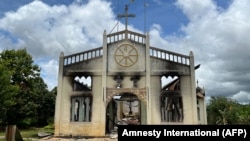Advancing freedom of religion has been a core objective of U.S. foreign policy since the International Religious Freedom Act of 1998 was signed into law. As part of that commitment, Secretary of State Antony Blinken this year re-designated Burma, the People’s Republic of China, Cuba, the DPRK, Eritrea, Iran, Nicaragua, Pakistan, Russia, Saudi Arabia, Tajikistan, and Turkmenistan as Countries of Particular Concern. These countries have engaged in or tolerated particularly severe violations of religious freedom.
This year, Azerbaijan was added to the list of Special Watch Countries. It joins Algeria, the Central African Republic, Comoros, and Vietnam for engaging in or tolerating severe violations of religious freedom.
Azerbaijan’s designation comes after the U.S. Commission on International Religious Freedom highlighted concerns about the preservation of Christian religious sites in Nagorno-Karabakh. The takeover by Azerbaijan of the breakaway region in September led nearly the entire population of 100,000 ethnic Armenians to flee to Armenia.
The commission also expressed concern over regulations on religious practice in the Muslim-majority country under President Ilham Aliyev, including passing restrictive amendments to its religion law, continuing to require and deny official registration to several religious groups, harassing and arresting Shi’a Muslim religious activists, and refusing to permit conscientious objection.
Secretary Blinken also designated al-Shabab, Boko Haram, Hayat Tahrir al-Sham, the Houthis, ISIS-Sahel, ISIS-West Africa, al-Qaida affiliate Jamaat Nasr al-Islam wal-Muslimin, and the Taliban as Entities of Particular Concern.
“Significant violations of religious freedom also occur in countries that are not designated,” noted Secretary Blinken. He urged these governments to end “attacks on members of religious minority communities and their places of worship, communal violence and lengthy imprisonment for peaceful expression, [and] transnational repression.” He also cited “calls to violence against religious communities, among other violations that occur in too many places around the world.”
“The challenges to religious freedom across the globe are structural, systemic, and deeply entrenched,” said Secretary Blinken. “But with thoughtful, sustained commitment from those who are unwilling to accept hatred, intolerance, and persecution as the status quo we will one day see a world where all people live with dignity and equality.”














